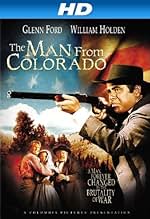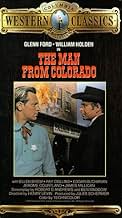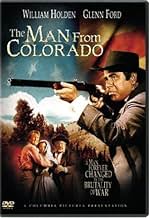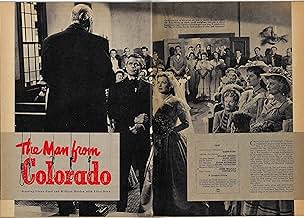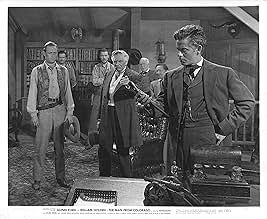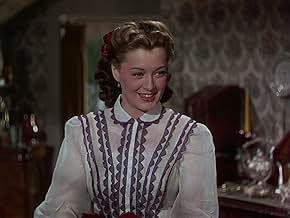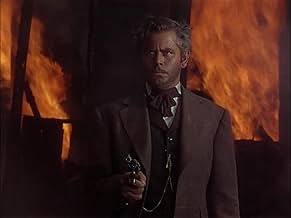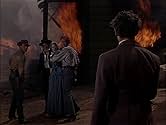IMDb RATING
6.6/10
2.1K
YOUR RATING
At the end of the Civil War, two friends return home to Colorado and one of them has changed and is violent and erratic.At the end of the Civil War, two friends return home to Colorado and one of them has changed and is violent and erratic.At the end of the Civil War, two friends return home to Colorado and one of them has changed and is violent and erratic.
- Director
- Writers
- Stars
- Awards
- 1 nomination total
William 'Bill' Phillips
- York
- (as Wm. 'Bill' Phillips)
Stanley Andrews
- Roger MacDonald
- (uncredited)
Emile Avery
- Townsman
- (uncredited)
Walter Bacon
- Townsman
- (uncredited)
Walter Baldwin
- Tom Barton
- (uncredited)
Symona Boniface
- Matron
- (uncredited)
Chet Brandenburg
- Party Guest
- (uncredited)
James Bush
- Cpl. Dixon
- (uncredited)
Nora Bush
- Townswoman
- (uncredited)
Boyd Cabeen
- Townsman
- (uncredited)
- Director
- Writers
- All cast & crew
- Production, box office & more at IMDbPro
Featured reviews
Glenn Ford was as good as anyone playing an intense psychotic, which he does here in this above-average western. Ford, playing "Col.Owen Devereaux," gets elected to the position of "judge" right after his distinguished career in the Civil War. Unfortunately, he has mental problems and this position carries too much weight for an unstable sort such as him to be carrying. His best buddy, "Capt. Del Stewart" (William Holden) sees his friend as he is and tries to reason with him and help him out but winds up being alienated, too, by the paranoid judge whose problems escalate as the story goes on.
There's not a tremendous amount of action in here, but it still moves pretty fast and looks really nice on DVD. This is one of the few color films of the 1940s.
Ellen Drew, Ray Collins and Ed Buchnan provide good supporting help in the story. If you like some of the Anthony Mann-James Stewart westerns of the late '40s/early '50s, you should like this one, too.
There's not a tremendous amount of action in here, but it still moves pretty fast and looks really nice on DVD. This is one of the few color films of the 1940s.
Ellen Drew, Ray Collins and Ed Buchnan provide good supporting help in the story. If you like some of the Anthony Mann-James Stewart westerns of the late '40s/early '50s, you should like this one, too.
The story is a fairly simple one. Col. Glenn Ford and Capt. Bill Holden return with a group of fellow soldiers to their home town after the Civil War has ended. Ford has been a pretty ruthless officer. The town has changed during their three-year absence. Their only source of livelihood were their gold claims, but federal laws converted those claims to private property and the mines were gobbled up by Big Ray Collins.
Collins backs Ford for the post of federal judge, and Ford appoints his best friend Holden as chief lawman. The disappointed ex-soldiers bring their case to Judge Ford who finds in favor of Collins. Judge Ford also marries the girl, Ellen Drew, whom Holden also loves. Well, frankly, the ex-soldiers are thoroughly browned off at the loss of their claims even though Big Ray gives them jobs at a barely livable wage ("digging out our own gold") before firing them. Some of the men become bandits preying on Collins' gold. Some don't. But all of them grow to hate Judge Ford for upholding the law, even coming to his house during a birthday party and insulting him in front of his wife and his guest, the friendly doctor, Ed Buchanan. "I don't blame [Collins]," shouts one of the angry crowd, "I blame you!" Ford throws them out.
The plot gets too complicated to describe in any detail but it can be summed up by saying that Judge Ford slugs Holden for telling him he's "sick inside" (people tell Judge Ford that he's "crazy" so often in this movie that it's no wonder he doesn't believe it). His punishments, while within the law, become outrageous. It isn't so much that he's on the side of Big Ray and the suits. It's that he's on his own trip. The movie ends happily, more or less, with Ford gone and Big Ray destroyed, and Holden riding off to Washington to see that the ex-soldiers and the rest of the town get their just due. He smiles at Allen as he boards the train and tells her, "I'll be back."
It's been pointed out repeatedly that "adult westerns" -- that is, those appearing after everybody started watching cheap Hopalong Cassidy movies on TV -- are a chronicle of their times. {"High Noon" is the most often cited example, although nobody seems quite sure of exactly which point of view the film took.) "The Man from Colorado" is no exception. Released in 1948, it's full of references to war veterans and the problems they experience after returning to their home towns. And Glenn Ford has clearly been twisted by his wartime experiences, as have some character in other late- or post-war movies -- William Bendix in "The Blue Dahlia" or whatever it's called, who keeps hearing "monkey music" in his head, or John Garfield in "Pride of the Marines," or Brian Keith in "Five Against the House," I think it was.
The topical references are the most interesting part of the movie, but they are grafted onto an otherwise routine plot. The movie is overorchestrated. If the characters sang their lines it would be grand opera. The wardrobe is undistinguished. The settings are cheesy. When an unjustly accused young veteran is lying against the wall of his jail cell, it looks like what it is: a plaster wall with bricks painted on it. But Makeup should get a medal. Glenn Ford has worn various dos during his career, from bookeeper to flat-top but nothing like this pompador.
Watch it if nothing else is on.
Collins backs Ford for the post of federal judge, and Ford appoints his best friend Holden as chief lawman. The disappointed ex-soldiers bring their case to Judge Ford who finds in favor of Collins. Judge Ford also marries the girl, Ellen Drew, whom Holden also loves. Well, frankly, the ex-soldiers are thoroughly browned off at the loss of their claims even though Big Ray gives them jobs at a barely livable wage ("digging out our own gold") before firing them. Some of the men become bandits preying on Collins' gold. Some don't. But all of them grow to hate Judge Ford for upholding the law, even coming to his house during a birthday party and insulting him in front of his wife and his guest, the friendly doctor, Ed Buchanan. "I don't blame [Collins]," shouts one of the angry crowd, "I blame you!" Ford throws them out.
The plot gets too complicated to describe in any detail but it can be summed up by saying that Judge Ford slugs Holden for telling him he's "sick inside" (people tell Judge Ford that he's "crazy" so often in this movie that it's no wonder he doesn't believe it). His punishments, while within the law, become outrageous. It isn't so much that he's on the side of Big Ray and the suits. It's that he's on his own trip. The movie ends happily, more or less, with Ford gone and Big Ray destroyed, and Holden riding off to Washington to see that the ex-soldiers and the rest of the town get their just due. He smiles at Allen as he boards the train and tells her, "I'll be back."
It's been pointed out repeatedly that "adult westerns" -- that is, those appearing after everybody started watching cheap Hopalong Cassidy movies on TV -- are a chronicle of their times. {"High Noon" is the most often cited example, although nobody seems quite sure of exactly which point of view the film took.) "The Man from Colorado" is no exception. Released in 1948, it's full of references to war veterans and the problems they experience after returning to their home towns. And Glenn Ford has clearly been twisted by his wartime experiences, as have some character in other late- or post-war movies -- William Bendix in "The Blue Dahlia" or whatever it's called, who keeps hearing "monkey music" in his head, or John Garfield in "Pride of the Marines," or Brian Keith in "Five Against the House," I think it was.
The topical references are the most interesting part of the movie, but they are grafted onto an otherwise routine plot. The movie is overorchestrated. If the characters sang their lines it would be grand opera. The wardrobe is undistinguished. The settings are cheesy. When an unjustly accused young veteran is lying against the wall of his jail cell, it looks like what it is: a plaster wall with bricks painted on it. But Makeup should get a medal. Glenn Ford has worn various dos during his career, from bookeeper to flat-top but nothing like this pompador.
Watch it if nothing else is on.
Colorado was a large, booming territory in 1865. It did not enter the union until eleven years later, and as the only new state to get admission in 1876 it has the right to remain our "Centennial" State (for the centennial of the Declaration of Independence). In the Civil War there were few engagements in Colorado, but one that did stick out was a massacre (there is no other way of putting it) of Indians by a Colonel Chivington at Sands Creek. Chivington's daughter had been raped by an Indian, and he took advantage of a relatively mild act of legal disobedience by the Indians to kill a good number of them.
"The Man From Colorado" is not dealing directly with the Sands Creek Massacre (no Indians are involved in the story). Instead, Chivington's character is transferred to Glenn Ford, who in the closing days of the Civil War perpetrates a similar atrocity, this time on surrendering Confederates. Ford and his friend William Holden have been through the whole war together, but Holden has managed to retain a sense of balance despite the horrors he has seen. Ford is on a slippery slope. Even after the atrocity he is still aware of his act of cruelty and writes in his diary about it. He can't control himself anymore.
Unfortunately his war record stands him well with the richest men in the territory, especially Ray Collins. Collins has managed to get control of the claims that should be used to pay the ex-Union troops. He wants a strong man to be the Federal judge of Colorado territory. Who better than the no-nonsense Ford? So Ford gets the judicial position. Holden has lost his old girlfriend (Ellen Drew) to Ford, but he remains a friend. However he and Drew are increasingly aware of Ford's mental instability. So is everyone (except Ray Collins), as Ford keeps giving the most draconian decisions from the bench. In particular to his former soldiers, now fighting to get back their claims. This, of course leads to their becoming bandits. A vicious cycle, of course. Holden and Drew may be able to break it - Drew has seen Ford's diary.
In the wake of World War II's returning men, and the many suffering psychological trauma, "The Man From Colorado" was a timely film. Ford never played a psychotic type as well as here. Holden (actually in a supporting role - before his burst into super stardom) is a great balance to Ford. Rains performs well as do most of the cast. And by the time the holocaust unleashed by Ford's appointment to the bench is finished, even Ray Collins wishes he never was dumb enough to put this man on the bench.
"The Man From Colorado" is not dealing directly with the Sands Creek Massacre (no Indians are involved in the story). Instead, Chivington's character is transferred to Glenn Ford, who in the closing days of the Civil War perpetrates a similar atrocity, this time on surrendering Confederates. Ford and his friend William Holden have been through the whole war together, but Holden has managed to retain a sense of balance despite the horrors he has seen. Ford is on a slippery slope. Even after the atrocity he is still aware of his act of cruelty and writes in his diary about it. He can't control himself anymore.
Unfortunately his war record stands him well with the richest men in the territory, especially Ray Collins. Collins has managed to get control of the claims that should be used to pay the ex-Union troops. He wants a strong man to be the Federal judge of Colorado territory. Who better than the no-nonsense Ford? So Ford gets the judicial position. Holden has lost his old girlfriend (Ellen Drew) to Ford, but he remains a friend. However he and Drew are increasingly aware of Ford's mental instability. So is everyone (except Ray Collins), as Ford keeps giving the most draconian decisions from the bench. In particular to his former soldiers, now fighting to get back their claims. This, of course leads to their becoming bandits. A vicious cycle, of course. Holden and Drew may be able to break it - Drew has seen Ford's diary.
In the wake of World War II's returning men, and the many suffering psychological trauma, "The Man From Colorado" was a timely film. Ford never played a psychotic type as well as here. Holden (actually in a supporting role - before his burst into super stardom) is a great balance to Ford. Rains performs well as do most of the cast. And by the time the holocaust unleashed by Ford's appointment to the bench is finished, even Ray Collins wishes he never was dumb enough to put this man on the bench.
Best friends Owen and Del, along with local men, are mustered out of the Union army at Civil War's end. Trouble is Big Ed has grabbed the men's gold-bearing land while the men were gone, and now, as a judge, Owen has to enforce the law in Big Ed's favor. This splits the community into warring factions.
Gritty, character-driven western. We know at outset that Owen (Ford) is a flawed character when his Union detachment shells surrendering Johnny rebs. In fact, Owen hides his killer instinct behind an uptight rendering of authority, whether as a colonel or as a federal judge. Ford plays the authoritarian part so grimly (count the smiles—I stopped at zero), it's hard to see how the charming Caroline would be attracted to him. Nonetheless, the interplay between best-friends Ford and Holden is involving and forms the story's core. Alliances between the various factions are sometimes hard to keep up with, but are more unpredictable than usual. And I especially like that final maneuvering around the bridge that I didn't see coming.
Columbia Studios popped for a lot of extras, along with fine special effects, especially when the burning wall comes down. Funny, though, how mountainous Colorado looks like greater LA. Too bad Columbia didn't pop for sending the crew at least to Lone Pine and the Southern Sierras. All in all, it's a very different kind of horse opera that avoids the usual clichés, with Ford at his absolute grimmest. Clearly, however, he and Holden are on their way up the Hollywood ladder.
Gritty, character-driven western. We know at outset that Owen (Ford) is a flawed character when his Union detachment shells surrendering Johnny rebs. In fact, Owen hides his killer instinct behind an uptight rendering of authority, whether as a colonel or as a federal judge. Ford plays the authoritarian part so grimly (count the smiles—I stopped at zero), it's hard to see how the charming Caroline would be attracted to him. Nonetheless, the interplay between best-friends Ford and Holden is involving and forms the story's core. Alliances between the various factions are sometimes hard to keep up with, but are more unpredictable than usual. And I especially like that final maneuvering around the bridge that I didn't see coming.
Columbia Studios popped for a lot of extras, along with fine special effects, especially when the burning wall comes down. Funny, though, how mountainous Colorado looks like greater LA. Too bad Columbia didn't pop for sending the crew at least to Lone Pine and the Southern Sierras. All in all, it's a very different kind of horse opera that avoids the usual clichés, with Ford at his absolute grimmest. Clearly, however, he and Holden are on their way up the Hollywood ladder.
"The Man From Colorado", filmed in 1948, portrays two men and how the trauma of the Civil War affected them, and those about them. Glenn Ford delivers a truly mesmerizing performance as a Civil War commander who is slowly being gripped by madness due to the violence of the War, while William Holden plays the part of a veteran of the same war, is able to cope with the aftermath, and yet, is unable to prevent his friend from sinking into degenerate madness.
After the war has ended, both men return to the same hometown to resume their lives. Ford is appointed as a federal judge of the territory, and he, in turn, names Holden as federal marshal. Ultimately, Ford's character sinks deeper into violence and glaring errors in carrying out justice, and Holden has to try and stop his former friend.
Don't let the age of the film deceive you, this movie does pack a message that can be applied today. An 8/10 viewing mark
After the war has ended, both men return to the same hometown to resume their lives. Ford is appointed as a federal judge of the territory, and he, in turn, names Holden as federal marshal. Ultimately, Ford's character sinks deeper into violence and glaring errors in carrying out justice, and Holden has to try and stop his former friend.
Don't let the age of the film deceive you, this movie does pack a message that can be applied today. An 8/10 viewing mark
Did you know
- TriviaColumbia Pictures spent quite a bit on The Man in Colorado. At one point, the crew dynamited the side of a 1500-foot mountain in California's San Fernando Valley in order to create a deep gorge as called for by the script. And the western town they constructed was one of the largest location sets ever built by Columbia up to that time. During filming of a massive fire scene at the end, however, the set caught fire uncontrollably, and Holden and Ford tried to actually fight the fire until firemen could arrive. "Dad came away coated in black soot, with burns to his arms and hands," Ford's son Peter later wrote.
- GoofsMany of the men are wearing trousers with belt loops and belts. Belt loops were not added to men's trousers until the 20th century.
- Quotes
Owen Devereaux: [voiceover as he writes in his diary] I killed a hundred men today. I didn't want to. I couldn't help myself. What's wrong with me? I'm afraid... afraid I'm going crazy.
- Crazy creditsOpening credits are listed in the pages of a book being turned by a hand.
- ConnectionsFeatured in La levée des Tomahawks (1952)
- SoundtracksWhen Johnny Comes Marching Home
(uncredited)
Written by Louis Lambert (pseudonym for Patrick Sarsfield Gilmore)
Played at the homecoming
- How long is The Man from Colorado?Powered by Alexa
Details
Box office
- Budget
- $1,000,000 (estimated)
- Runtime
- 1h 40m(100 min)
- Color
- Aspect ratio
- 1.37 : 1
Contribute to this page
Suggest an edit or add missing content


